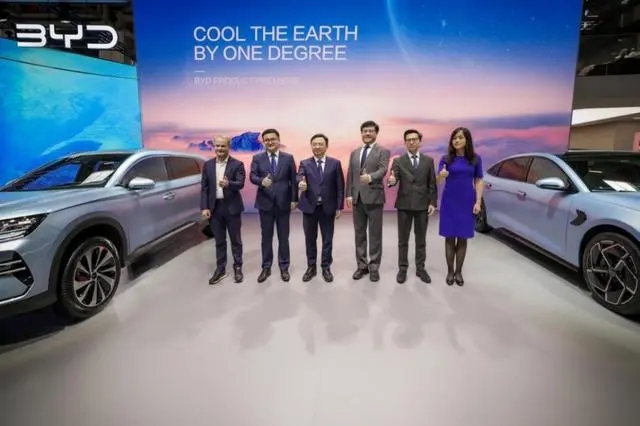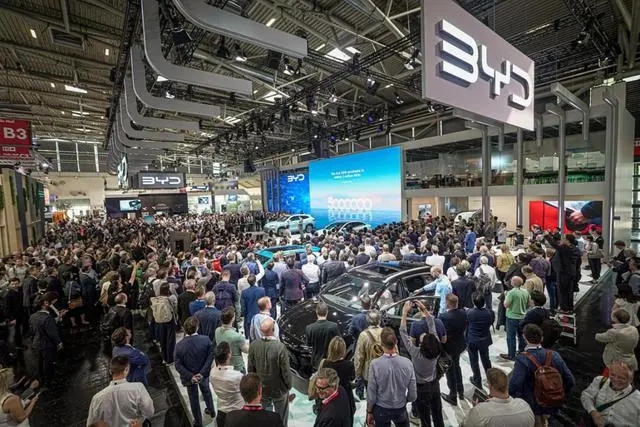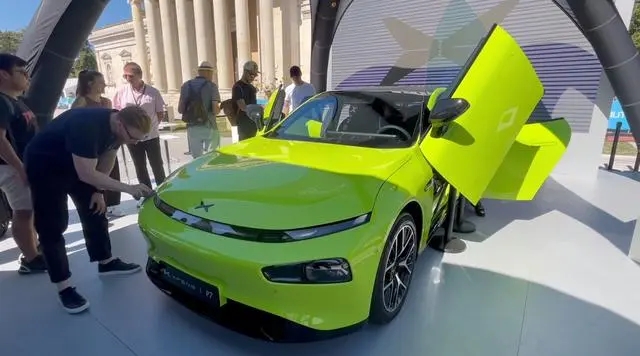Author:MarwenDate:2023-9-8

On September 4, the 2023 German International Automobile and Smart Mobility Expo (hereinafter referred to as the "Munich Auto Show") opened in Munich. Many well-known companies showcased future mobility products and innovative technologies in automobiles, bicycles and other fields through different forms.
As one of the five major auto shows in the world first established in 1897, the importance of the Munich Auto Show is self-evident. However, the reality is that the momentum of the Munich Auto Show has declined significantly in recent years. More and more traditional mainstream car brands are absent, and the scale of the exhibition has gradually shrunk. At this year’s auto show, Japanese car manufacturers such as Toyota and Nissan did not participate in the exhibition, and even the local European giant STELLANTIS Group was not among the exhibitors.
The reporter noticed that the situation at this year's Munich Auto Show was different—Chinese automakers and industrial chain companies began to pour in and occupy a certain position. According to statistics, at this Munich Auto Show, the number of Chinese automotive industry-related companies exceeded 50, including complete vehicles, three-electric systems, automotive software and other fields.

More than 50 Chinese companies participated in the exhibition in three major categories
According to the official exhibitor information released by the Munich Auto Show, there are more than 700 exhibitors, including more than 50 companies in the Chinese automotive industry going overseas, which can be roughly divided into overseas vehicles, battery electric drive and electronic control, charging and smart car electronics and software Three categories.
In terms of complete vehicles, the currently announced brands participating in the exhibition include BYD, Leapmotor, Avita, Celes, MG, and Xpeng, 6 auto brands from China. Exhibitors in the battery field include Ningde Times, Yiwei Lithium Energy, Sunwoda, Zhongxinhang, Ruipu Lanjun, Funeng Technology and other 13 companies.
In terms of smart car software and hardware, it includes autonomous driving, intelligent assisted driving solution providers or lidar providers such as Horizon, Yikatong, Qingzhou Zhihang, Liangdao Intelligence, Yuanrong Qixing, Gatland Microelectronics, SenseTime, and Zongmu Technology and other smart driving hardware providers.
Specifically, the scale of BYD's booth this time surpassed that of Mercedes-Benz, with an area of 915 square meters, the largest among all exhibitors. At the same time, 6 new energy vehicles were unveiled, including BYD Seal (named overseas as SEAL), Song PLUSEV Champion Edition (named overseas as SEALU), Yuan PLUS (named overseas as ATTO3), Seal, Han and Denza D9.
In addition to BYD, Leapmotor also attracted attention at this Munich Auto Show. It not only released the LEAP3.0 technology architecture, the latest result of eight years of global self-research, but also released the C10, the first global model based on this architecture.
At the same time, Xpeng Motors also brought the Xpeng G9 and the international version P7i to this world-renowned international auto show for the first time, and announced that it will enter the German market in 2024 and more global strategic plans. Just on July 26 this year, the news that Xiaopeng Motors and Volkswagen reached a strategic technical cooperation caused a global sensation and attracted strong attention.
The independent new brand Avita, established by three giants, Changan Automobile, CATL and Huawei, made the world premiere of its second model - Avita 12 at this Munich Auto Show, which not only shows its emphasis and expectations on the European market , and also hope to further expand the brand influence and market share through this model.
As the best-selling Chinese car brand in Europe, SAIC MG will naturally not miss the opportunity to show off its capabilities. At this Munich Auto Show, it will debut three blockbuster new cars, namely MGC Cyberster, MG4 Electric XPOWER performance version and electric SUV Marvel R.
European car companies will continue to expand investment in the Chinese market

Naturally, the Munich Auto Show does not lack the participation of traditional giants. Germany's local automakers such as Volkswagen, Mercedes-Benz and BMW all appeared, bringing the latest models and technologies. A group of executives also came to the scene to give the latest updates on new energy changes and industry development. view.
We all know that Europe has established itself as a dominant player in the automotive sector over the past few decades by building quality internal combustion engine cars. But that competitive advantage is being eroded as demand for electric vehicles grows and Chinese companies are able to produce batteries at a lower cost.
In this regard, BMW Group Chairman and CEO Zipzer said that the EU's policy of banning internal combustion engine vehicles has prompted traditional car brands to begin direct competition with Chinese car brands, but it is difficult for traditional brands to gain an advantage. He believes that brands below 300,000 yuan will be hit by Chinese brands, but luxury brands such as BMW are still able to withstand the "threat".
Christophe Perilla, chief executive of French auto parts maker Valeo, said China is now the company's main market because previous barriers to entry for internal combustion vehicles have been removed. This has made Chinese new energy car companies not only stand out in the country, but also become potential car exporters.
The show coincides with Obermo's first anniversary as CEO of Volkswagen Group. Under his leadership, the Volkswagen Group is implementing a series of key measures including the "Ten-Point Action Plan" to ensure the Group's transformation into the most important areas. "One of the first focuses of the 'Ten-Point Action Plan' is to focus on the group's development in China. The Volkswagen Group has formulated a clear plan to give the China region greater autonomy to achieve a more agile decision-making process." Obermu said, The Chinese and North American markets will be the engines driving future growth. The Chinese market is full of unique challenges. At present, there is no region in the world where the transformation of the auto industry is as significant and rapid as the Chinese market.
According to Steiner, head of Porsche's R&D department, Chinese automakers are Porsche's most powerful competitors, especially in the development of battery technology. "For Porsche, we are looking for better batteries with higher energy density. The company is focusing on building high-quality components to differentiate itself from Chinese competitors and strive for a dominant position."
Mercedes-Benz CEO Kallenius said: "The global economy is facing challenges, but this will not change our long-term commitment to the Chinese market. We will continue to expand our investment in the Chinese market."
"The distinctive feature of China's automobile market is its strong innovation vitality, and Chinese customers are willing to accept emerging technologies and high-tech products. We are accelerating innovation in a faster and more agile way to meet the needs of Chinese customers, and we will also More and more functions and configurations developed in China are being pushed to the global market.” Kang Linsong said.
↓Next [ Leading the reform of the automobile industry - looking at the new trends in the development of new energy vehicles in my country from the 2023 Smart Expo ]









